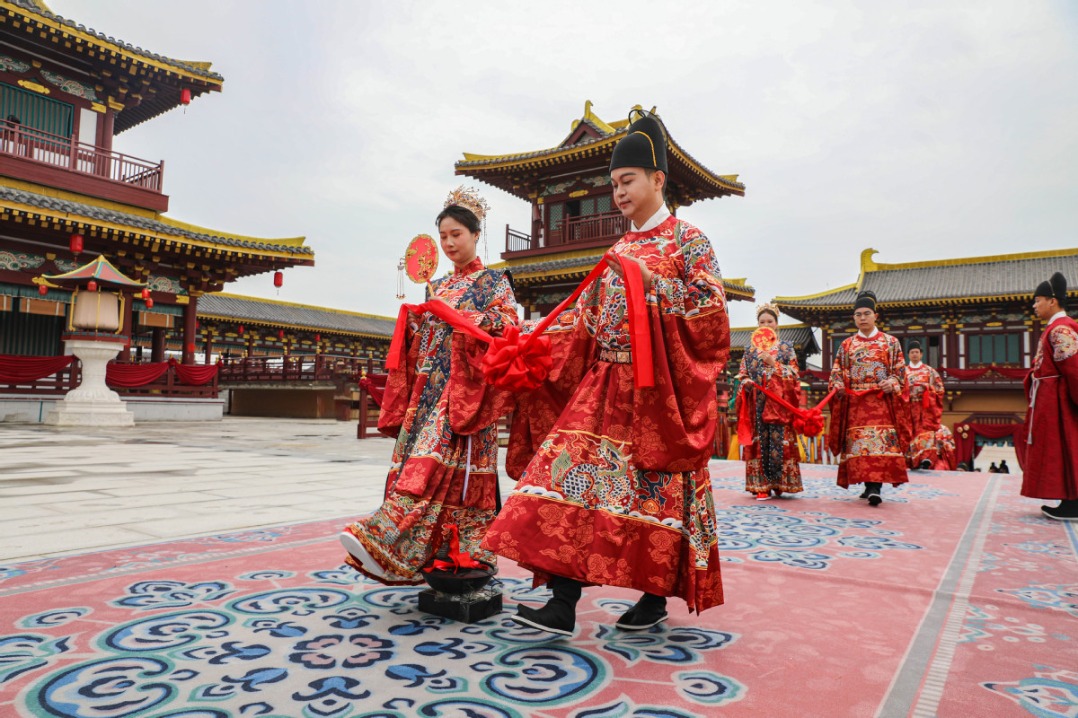Prayer flags bring blessings to those who sew them


Prayer flags, the rectangular, colored cloth carrying messages of blessing, are found everywhere in the Tibet autonomous region-strung on the roofs of houses, in trees and along riversides and mountain ridges.
It is a custom for Tibetan families to replace the prayer flags on their roofs with new ones before sunrise on the second day of the Tibetan New Year (which began on Feb 16 this year), praying for a good harvest in the new year.
The dyed flags are sewn in a specific order on strings-blue, white, red, green and yellow-to represent, respectively, the five elements of sky, cloud, fire, water and earth. The prayer flags show the great reverence that Tibetans have for nature.
Palyang, a 31-year-old housewife from Dardrong town of Nyemo county-the main area for producing prayer flags-has worked as a flag sewer for nearly six years.
Leaving their hometown for work seems impossible for housewives like Palyang, since they assume daily household chores while their husbands are usually engaged with farm work.
The government of Nyemo county has encouraged local entrepreneurs to start flag workshops by offering them free land since 2011, where local residents can work in their spare time rather than leaving home for work.
"I can manage the chores and the work at the same time," Palyang said with a laugh. "Time is rather flexible here. I make flags here after I finish milking the cows and cooking meals for my family."
Palyang works with 32 others at a workshop opened in 2011 in Nyemo by a businessman named Galsang.
"I started the workshop with the help of the government seven years ago," said Galsang. "Impoverished people and housewives are welcome to work at the workshop, and (full-timers) can get a monthly wage of 3,000 yuan at least."
Palyang, who works part-time, said her work is not measured by time but by the length of the flags she sews. She earns 5 yuan (80 cents) per 100 meters. She used to sew 200 meters each day with a traditional pedal sewing machine, but now sews more than 400 meters using an electric machine.
"My husband has part-time jobs in his spare time, and my father and I work at the workshop after finishing the family chores. The household income of my family can reach 50,000 to 60,000 yuan per year, which provides a rather comfortable life for my family members," said Palyang.
Prayer flags and other products that Palyang has made are taken every day at 5 pm from Nyemo to Lhasa, which is 140 kilometers away, where Galsang manages a retail store on Barkhor Street.
He said the workshop offers services of purchasing raw materials, production and retailing, which gives him a great price advantage and good revenue.
"The value output of my business reached 3.6 million yuan in 2017, and we got an appreciation of 300,000 yuan apart from costs and workers' salary. More residents want to join us. We now have another two restaurants and one wood-carving factory," said Galsang.
- Couples celebrate traditional Chinese group wedding in Shandong
- China takes to road on first day of national holiday
- China deploys patrols on water, in air around Huangyan Island
- Macao SAR celebrates National Day with flag-raising, reception
- China to expand its participatory law-making process
- World's largest-capacity centrifuge goes into operation in Hangzhou




































